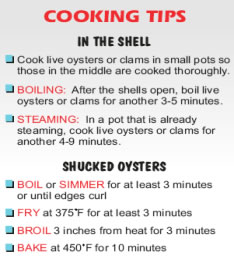WARNING!
Certain people with serious, underlying medical conditions have an increased risk of serious illness or death from Vibrio vulnificus; a naturally occurring organism found in some coastal waters. Most people get vibriosis by eating raw or undercooked shellfish (particularly oysters), however, vibriosis can also be contracted when an open wound comes in contact with coastal waters, or by swallowing it, according to the U.S. Centers for Disease Control and Prevention.
People having an increased risk include, but are not restricted to, those affected by AIDS; chronic alcohol abuse; liver, stomach or blood disorders; cancer, diabetes and kidney disease. These individuals should never consume raw shellfish. Individuals that are uncertain of their health status should seek the advice of a physician.
General Guidelines
Harvest shellfish only from open areas that are classified "Approved" or "Conditionally Approved." Only purchase shellfish that have been processed by a Certified Shipper. Permitted Retail Food Establishments are required by law to maintain shellstock identification tags on file for at least 90 days. This tag contains important harvest and processor information - ask to see it if it is not displayed. Shucked oysters in containers less than 64 oz. should display a certification number and "sell-by" date.
Containers with a capacity of more than 64 oz. must have a "shucked" date. Non-frozen shellfish should be stored between 34 and 45 degrees Fahrenheit. Any in-shell shellfish that gape open should be discarded. Thorough cooking may reduce some risk.
Again, if you have a serious underlying health condition, do not consume raw shellfish.
Below are shellfish cooking tips, provided by Interstate Shellfish Sanitation Conference (ISSC).

- National Shellfish Sanitation Program (NSSP) - 2023 Guide for the Control of Molluscan Shellfish
- The Interstate Shellfish Sanitation Conference (ISSC) - Consumption of Raw Molluscan Shellfish
Shellfish Closure Updates
For shellfish closure updates, visit our interactive map or call 1-800-285-1618.

